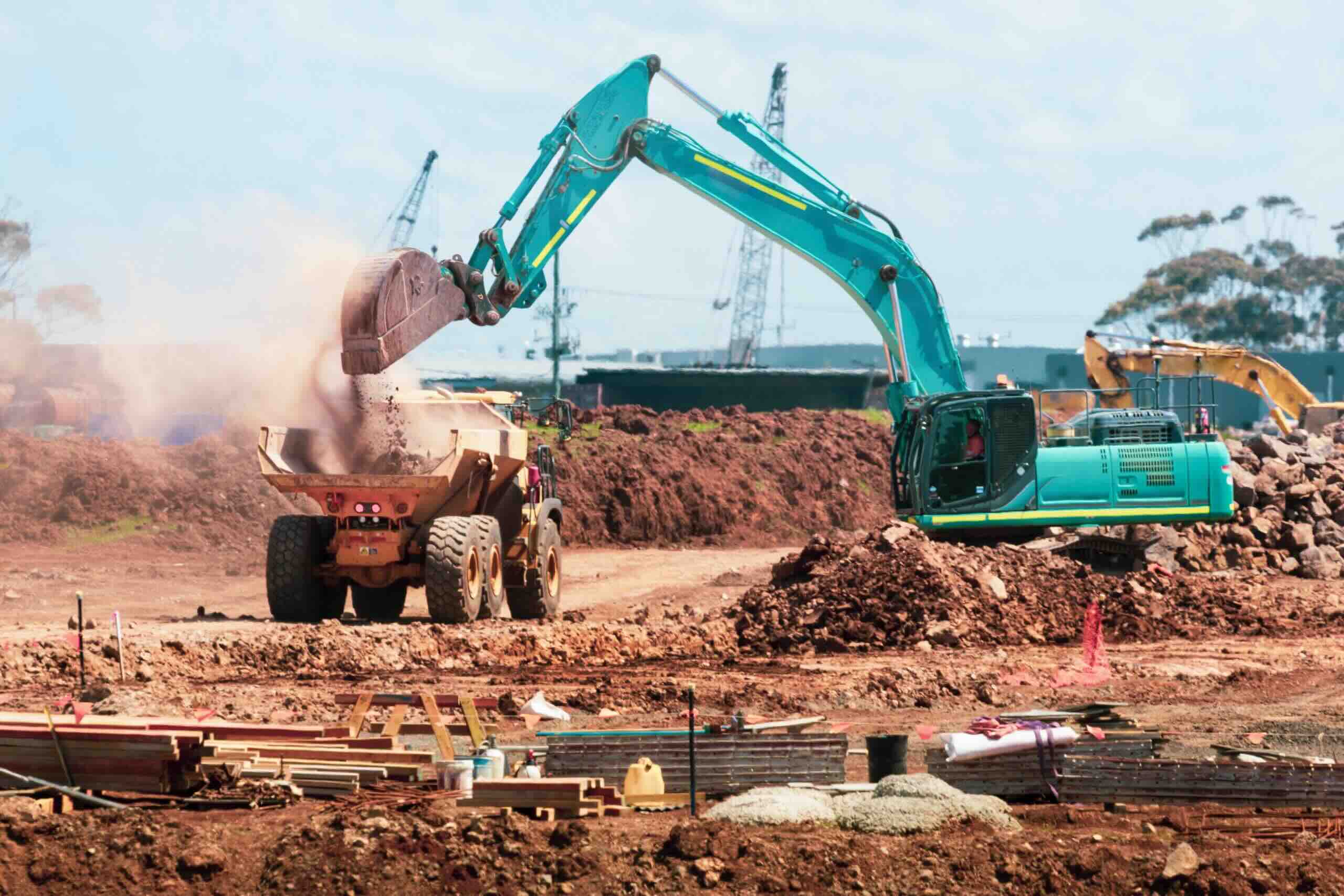Home>diy>Building & Construction>How To Be A Contractor In The Construction Industry


Building & Construction
How To Be A Contractor In The Construction Industry
Modified: October 20, 2024
Learn the essential steps to become a successful contractor in the building construction industry. Gain valuable insights and expert advice on launching your career today!
(Many of the links in this article redirect to a specific reviewed product. Your purchase of these products through affiliate links helps to generate commission for Storables.com, at no extra cost. Learn more)
Introduction
Being a contractor in the construction industry requires a unique set of skills and qualifications. Whether you’re passionate about building homes, renovating spaces, or working on large-scale infrastructure projects, becoming a successful contractor takes time, dedication, and expertise.
In this article, we will explore the step-by-step process of how to become a contractor in the construction field. From obtaining the necessary qualifications and licenses to managing construction projects and ensuring quality control, we will cover everything you need to know to embark on a successful career as a contractor.
Contractors play a vital role in the construction industry, overseeing projects from start to finish and coordinating the efforts of various trades and subcontractors. They are responsible for ensuring that projects are completed on time, within budget, and in compliance with building codes and regulations.
While the path to becoming a contractor may vary depending on your location and the specific requirements of your industry, the following steps provide a comprehensive guide to get you started on this exciting career journey.
Key Takeaways:
- Becoming a successful contractor in the construction industry involves obtaining qualifications, gaining experience, understanding legal requirements, and developing a comprehensive business plan. Effective communication, quality control, and financial management are also crucial for success.
- To thrive as a contractor, it’s essential to build a strong network, bid on projects, and manage the construction process with attention to safety and quality. Continuous learning and adaptability are key to long-term success in the dynamic construction industry.
Read more: What Is The Future Of Construction Industry
Step 1: Obtain the necessary qualifications and licenses
Becoming a contractor in the construction industry often requires obtaining certain qualifications and licenses. These credentials not only demonstrate your knowledge and expertise but also ensure that you are legally allowed to operate in your chosen field.
The specific qualifications and licenses you need will depend on your location and the type of construction work you intend to engage in. Here are some common requirements:
- Educational qualifications: Many contractors start by obtaining a high school diploma or equivalent. However, pursuing higher education in construction-related fields such as civil engineering, architecture, or construction management can provide you with a competitive edge.
- Trade certifications: Depending on the nature of your work, you may need to acquire trade-specific certifications. For example, if you plan to work as an electrician, you will need to obtain an electrician’s license or certification.
- Contractor’s license: Most jurisdictions require contractors to obtain a contractor’s license. This typically involves passing an examination that evaluates your understanding of construction practices, building codes, and safety regulations.
- Insurance and bonding: It’s crucial to have the necessary insurance coverage to protect yourself, your clients, and your employees from potential liability. Additionally, some construction projects may require contractors to be bonded, which provides financial assurance to clients in case of non-completion or other contractual breaches.
To obtain these qualifications and licenses, you may need to complete specific educational programs, apprenticeships, or on-the-job training. It’s essential to research the requirements in your area and ensure that you fulfill all the necessary criteria.
Once you have obtained the appropriate qualifications and licenses, it’s important to keep them up to date. Stay informed about any changes in regulations or industry standards, and renew your licenses as required.
By obtaining the necessary qualifications and licenses, you establish yourself as a trustworthy and competent contractor, instilling confidence in your clients and ensuring compliance with legal and safety regulations.
Step 2: Gain experience in the construction industry
In addition to obtaining the necessary qualifications and licenses, gaining hands-on experience in the construction industry is essential for becoming a successful contractor. Experience not only enhances your skills and knowledge but also builds your reputation and credibility.
Here are some strategies to gain valuable experience:
- Apprenticeships and internships: Consider participating in apprenticeship programs or internships offered by construction companies or trade organizations. These opportunities allow you to work alongside experienced professionals, learn practical skills, and gain industry insights.
- Work as a subcontractor: Joining a construction project as a subcontractor is an excellent way to gain on-the-job experience while working on specific tasks. Collaborating with established contractors allows you to observe their project management skills, network with industry professionals, and learn from their expertise.
- Volunteer or charitable projects: Participate in community projects or volunteer your services to charitable organizations. Not only does this contribute to the betterment of society, but it also provides you with hands-on experience and the opportunity to showcase your skills to potential clients or employers.
- Seek mentorship: Connect with experienced contractors who can serve as mentors and guide you in your career development. They can provide valuable advice, share industry knowledge, and help you navigate through various challenges that arise in the construction industry.
- Continuous learning: Stay updated with the latest industry trends, technological advancements, and construction techniques. Attend workshops, seminars, and conferences to expand your knowledge base and stay ahead of the curve.
Remember, building experience takes time and dedication. Focus on honing your skills and learning from every opportunity that comes your way. As you gain more experience, you will become more confident in managing construction projects and handling the complexities of the industry.
Building a solid foundation of experience not only enhances your professional capabilities but also instills trust in your clients, subcontractors, and employees. Your track record and reputation in the construction industry will significantly impact your success as a contractor.
Step 3: Understand legal and regulatory requirements
As a contractor in the construction industry, it is crucial to have a clear understanding of the legal and regulatory requirements that govern your work. Compliance with these requirements not only ensures the safety and integrity of your projects but also protects you from legal liabilities.
Here are some key areas of legal and regulatory compliance to consider:
- Building codes and permits: Familiarize yourself with the local building codes and permit requirements in your area. These codes outline the minimum standards for health, safety, and structural integrity in construction projects. Obtaining the necessary permits and adhering to building codes is essential to avoid penalties and ensure that your projects meet the required standards.
- Labor laws and employment regulations: Stay informed about labor laws and employment regulations that apply to the construction industry. This includes compliance with minimum wage laws, workers’ compensation, overtime payment, and workplace safety standards. It is important to treat your workers fairly and create a safe and healthy working environment.
- Environmental regulations: Construction projects often have an impact on the environment. Familiarize yourself with environmental regulations related to waste management, pollution control, and environmental conservation. Implement mitigation measures to minimize the environmental impact of your projects and ensure compliance with relevant laws.
- Contractual agreements: Working as a contractor involves entering into various contracts, including agreements with clients, subcontractors, suppliers, and other stakeholders. It is vital to have a clear understanding of contract law and seek legal advice when drafting or reviewing contracts. This will help protect your rights and ensure that all parties involved are held accountable.
- Insurance requirements: Understand the insurance coverage required in your industry. This may include general liability insurance, workers’ compensation insurance, and professional liability insurance. Adequate insurance coverage protects you and your clients in the event of accidents, injuries, property damage, or financial disputes.
Staying well-informed and compliant with legal and regulatory requirements is essential for operating as a reputable contractor. Ignorance of these requirements can lead to costly legal issues, reputational damage, and even project delays or cancellations. It is advisable to consult legal professionals or experts in construction law to ensure that you are fully compliant with all applicable regulations.
By understanding and adhering to legal and regulatory requirements, you establish yourself as a responsible and trustworthy contractor, enhance your professional reputation, and build trust with clients and stakeholders.
Step 4: Develop a business plan
A well-crafted business plan is a vital component of running a successful contracting business in the construction industry. It acts as a roadmap, guiding your decision-making processes and helping you achieve your goals.
Here are key elements to consider when developing your business plan:
- Executive Summary: Introduce your business and provide an overview of your goals, target market, and competitive advantage.
- Company Description: Describe your business entity, its structure, and the types of construction services you will offer. Explain your unique selling proposition and how you will differentiate yourself from competitors.
- Market Analysis: Conduct a thorough analysis of the construction industry in your target market. Identify your ideal clients, analyze the competition, and assess market trends and opportunities.
- Organizational Structure: Outline the organizational structure of your business, including key personnel, their roles, and responsibilities. Also, consider hiring needs, training plans, and succession planning.
- Service Offering: Detail the construction services you will offer, including the range of projects you can handle and the specific skills and expertise you bring to the table.
- Marketing and Sales Strategy: Define how you plan to market your services, attract clients, and generate leads. Include your pricing strategy, promotional activities, and plans for building a strong referral network.
- Financial Projections: Develop realistic financial projections, including revenue forecasts, expenses, and profitability analysis. This will help you assess the financial viability of your business and secure financing if needed.
- Risk Assessment: Identify potential risks to your business and develop strategies for mitigating them. This includes assessing legal and regulatory risks, economic factors, and industry-specific challenges.
- Implementation Plan: Create a timeline and action plan for launching and operating your business. Break down your goals and objectives into manageable tasks and consider any necessary resources or partnerships.
- Monitoring and Evaluation: Clearly define how you will monitor your business’s performance and evaluate progress. Set key performance indicators (KPIs) and establish benchmarks to measure success.
A well-thought-out business plan not only provides you with a roadmap but also serves as a valuable tool when seeking financing, securing partnerships, or attracting potential clients. It demonstrates your professionalism, strategic thinking, and commitment to success.
Remember to regularly review and update your business plan as your business evolves, market conditions change, and new opportunities arise. Adaptability and flexibility are key in the ever-evolving construction industry.
By developing a comprehensive business plan, you set yourself up for success and increase your chances of achieving your long-term goals as a contractor in the construction industry.
Read more: What Type Of Industry Is Construction
Step 5: Build a network of contacts
Building a strong network of contacts is essential for success in the construction industry. A robust network can provide you with valuable opportunities, referrals, and industry insights that can help grow your contracting business.
Here are some strategies to build and nurture your professional network:
- Attend industry events: Participate in trade shows, conferences, and seminars related to the construction industry. These events provide an excellent platform to meet fellow contractors, potential clients, suppliers, and industry experts. Be proactive in engaging with others and exchanging contact information.
- Join industry associations: Become a member of construction-related associations and organizations. These groups often offer networking events, educational resources, and forums for sharing best practices. Engage in discussions, contribute your knowledge, and build relationships with other members.
- Utilize online platforms: Leverage social media platforms, such as LinkedIn, to connect with professionals in the construction industry. Join relevant groups or forums where you can interact with others, share insights, and build connections. Regularly engage with your network by commenting on posts and sharing valuable content.
- Partner with subcontractors and other professionals: Collaborate with subcontractors, architects, engineers, and other professionals in the industry. Building strong relationships with these individuals can lead to mutually beneficial partnerships and referrals for future projects.
- Attend local business events: Participate in local business events and networking gatherings. Connect with professionals from other industries, such as real estate agents, property developers, or interior designers. These connections can lead to collaborations or referrals.
- Offer value to your network: Be proactive in offering help and support to your contacts. Share your expertise, provide advice, and refer projects or opportunities to others when appropriate. Building a reputation as a helpful and reliable professional will strengthen your network and increase the likelihood of receiving support in return.
Remember that building a network is not just about what others can offer you; it’s also about building genuine relationships and providing value to others. Foster meaningful connections by being authentic, trustworthy, and professional in your interactions.
Nurturing your network requires consistent effort and communication. Stay in touch with your contacts regularly by attending events, scheduling meetings, or sending personalized emails. Remember to express gratitude and acknowledge referrals or assistance received.
A strong network of contacts can provide you with opportunities to expand your business, learn from others, and stay updated on industry trends. By investing time and effort in building and maintaining your network, you significantly enhance your chances of success as a contractor in the construction industry.
Always have a detailed contract in place before starting any construction project. This will help protect both you and the client in case of any disputes or issues that may arise.
Step 6: Bid on construction projects
One of the key responsibilities of a contractor is to actively bid on construction projects. Winning bids not only generate revenue but also provide opportunities to showcase your skills and grow your reputation in the industry.
Here are some steps to effectively bid on construction projects:
- Research: Thoroughly research and identify construction projects that align with your expertise and capabilities. Stay updated on upcoming projects through industry publications, online platforms, and networking contacts. Analyze project requirements, specifications, and deadlines to ensure they are a good fit for your business.
- Estimate Costs: Develop accurate cost estimates for the project. Consider labor, materials, equipment rentals, subcontractor fees, permits, and other relevant expenses. Use historical data, industry benchmarks, and your own experience to calculate costs. It’s important to be both competitive and realistic in your estimates.
- Prepare Proposal: Create a professional and comprehensive bid proposal. Include a cover letter, project overview, scope of work, schedule, cost breakdown, and any additional information requested by the client. Customize your proposal to highlight your unique strengths and how you intend to deliver value to the project.
- Submit Bid: Follow the submission instructions provided by the client. Submit your bid proposal within the specified deadline, ensuring all required documentation is included. Double-check for accuracy and completeness before submitting. Late or incomplete bids may be disqualified.
- Follow Up: After submitting your bid, follow up with the client to confirm receipt and express your interest in the project. If the client requests additional information or clarification, respond promptly and professionally. Be proactive in addressing any concerns or questions they may have.
- Review Results: Once the bidding process is complete, review the results and evaluate your performance. If you win the project, celebrate your success and begin preparations for project execution. If you do not win, seek feedback from the client to identify areas for improvement in future bids.
It’s important to note that bidding on construction projects can be a competitive process. To increase your chances of success, consider the following strategies:
- Build relationships: Cultivate relationships with potential clients, architects, and industry professionals. Building a network and establishing a positive reputation can lead to more opportunities to bid on projects.
- Offer a competitive edge: Highlight your unique qualifications, experience, and expertise in your bid proposal. Emphasize how your approach, team, or technology can give you a competitive advantage over other contractors.
- Deliver on commitments: Ensure that you consistently deliver high-quality work, meet deadlines, and communicate effectively with clients. Positive testimonials and references from previous projects can significantly strengthen your bid proposals.
- Stay informed: Stay updated on industry trends, emerging technologies, and best practices. This knowledge can help you tailor your bids to meet the evolving needs of clients.
Remember, bidding on construction projects requires careful planning, attention to detail, and effective communication. With experience and a strong reputation, you can successfully secure construction projects that contribute to the growth and success of your contracting business.
Step 7: Manage the construction process
Managing the construction process is a critical step for contractors to ensure that projects are completed effectively, efficiently, and to the satisfaction of clients. It involves overseeing all aspects of the project, from planning and scheduling to monitoring progress and resolving issues that may arise along the way.
Here are key steps to effectively manage the construction process:
- Project Planning: Evaluate project requirements, objectives, and constraints. Create a detailed project plan that includes timelines, resources, and milestones. Break down the project into manageable tasks and allocate responsibilities to your team members.
- Contractor Coordination: Collaborate with subcontractors, suppliers, and other stakeholders involved in the project. Ensure clear communication and coordination among all parties to maintain a smooth workflow. Establish regular meetings and progress reports to keep everyone well-informed and aligned.
- Resource Management: Effectively manage resources, including labor, equipment, and materials. Schedule and allocate resources according to project requirements, ensuring that they are used efficiently. Monitor resource usage to prevent delays or shortages.
- Quality Control: Implement quality control measures to ensure that work meets or exceeds industry standards and client expectations. Conduct regular inspections and audits to identify and address any issues promptly. Maintain proper documentation of inspections and quality checks.
- Communication: Maintain open and clear communication channels with clients, keeping them updated on project progress, potential changes, and any issues that may arise. Promptly address client concerns and seek their input to ensure their satisfaction.
- Schedule Management: Monitor the project schedule closely to ensure that tasks are completed on time. Adjust the schedule as needed to accommodate changes or unforeseen circumstances. Keep stakeholders informed about any schedule adjustments or potential impacts.
- Risk Management: Identify and assess potential risks and develop strategies to mitigate them. Regularly review and update the risk management plan throughout the construction process. Implement safety protocols to ensure a safe working environment for everyone involved.
- Financial Monitoring: Monitor project costs and expenses to ensure they align with the budget. Track and document all financial transactions related to the project. Address any financial issues or discrepancies promptly to maintain financial stability.
- Issue Resolution: Proactively address any issues that arise during the construction process. Work collaboratively with the project team to find suitable solutions and keep the project on track. Promptly communicate any significant issues to clients and stakeholders, outlining the steps taken to resolve them.
- Documentation and Reporting: Maintain detailed records of all project-related activities, including contracts, permits, change orders, and correspondence. Generate regular progress reports for clients and stakeholders, highlighting key milestones and achievements.
Successfully managing the construction process requires effective leadership, strong communication skills, attention to detail, and the ability to adapt to changing circumstances. A well-managed construction process not only ensures the timely completion of projects but also builds a strong reputation for your contracting business.
By effectively managing the construction process, you demonstrate your professionalism, commitment to quality, and dedication to delivering successful projects to your clients.
Step 8: Ensure quality control and safety measures
Ensuring quality control and implementing safety measures are crucial aspects of being a responsible contractor in the construction industry. By prioritizing quality and safety, you can protect the well-being of workers, mitigate risks, and deliver projects that meet or exceed client expectations.
Here are key steps to ensure quality control and safety measures:
- Develop a Quality Control Plan: Create a comprehensive quality control plan that outlines your standards, procedures, and expectations regarding workmanship, materials, and construction practices. Establish quality control checkpoints and inspections throughout the project to monitor compliance.
- Adhere to Building Codes and Regulations: Stay up to date with local building codes, regulations, and industry standards. Ensure that all work performed on the project complies with these requirements. Regularly review and communicate any updates or changes to the project team.
- Conduct Regular Inspections: Carry out regular inspections at various stages of the project to identify and address any quality or safety issues. This includes inspections of materials, structural components, and finished work. Document all inspections and address any non-compliance promptly.
- Implement Safety Protocols: Develop and enforce comprehensive safety protocols to protect the well-being of workers and minimize the potential for accidents or injuries. Provide proper safety training to all employees and subcontractors and ensure that safety measures are consistently followed on the job site.
- Use Proper Equipment and Tools: Ensure that all equipment and tools used on the job site are in good working condition and meet required safety standards. Regularly inspect and maintain equipment to prevent malfunctions or accidents due to faulty machinery.
- Promote a Safety Culture: Foster a culture of safety among your team and subcontractors. Encourage open communication about safety concerns and actively address any hazards or unsafe practices. Recognize and reward individuals or teams that prioritize safety and follow best practices.
- Document and Address Non-Conformance: If any quality or safety issues are identified, document them and take prompt corrective action. Investigate the root causes of non-conformance and implement preventive measures to avoid similar issues in the future. Communicate any changes or resolutions to the project team and stakeholders.
- Regularly Train and Educate: Provide ongoing training and education to your team on quality control and safety measures. Stay informed about the latest industry trends, technologies, and best practices to continually improve your quality and safety standards.
- Benchmark and Continuous Improvement: Regularly benchmark your quality control and safety practices against industry best practices. Seek feedback from clients and stakeholders to identify areas for improvement and implement changes to enhance quality and safety performance.
By ensuring quality control and implementing robust safety measures, you demonstrate your commitment to delivering safe and high-quality construction projects. Not only do these measures protect workers and project stakeholders, but they also enhance your reputation as a reliable and responsible contractor.
Remember that quality and safety are ongoing efforts. Continuously monitor, assess, and improve your quality control and safety practices throughout the entire construction process.
Read more: What Is Tender In Construction Industry
Step 9: Handle financial aspects and project budgeting
Effectively managing the financial aspects of your construction projects is essential for the success and profitability of your contracting business. Accurate project budgeting and careful financial management play a vital role in ensuring that your projects stay within budget and meet your financial goals.
Here are key steps to handle financial aspects and project budgeting:
- Create a Project Budget: Develop a detailed project budget that outlines all the anticipated costs, including labor, materials, equipment, permits, subcontractors, and overhead expenses. Take into account all possible contingencies and allowances for unforeseen expenses.
- Estimate Costs Accurately: Conduct thorough cost estimates for each aspect of the project. Utilize historical data, industry benchmarks, and expertise to project accurate costs. Consider the specific requirements of the project and account for potential cost fluctuations in materials or labor.
- Track Expenses: Implement a robust system for tracking and recording all project-related expenses. Regularly update the budget with actual costs and compare them to the estimated costs. This helps you identify any discrepancies and take corrective action if necessary.
- Manage Cash Flow: Monitor cash flow closely to ensure that you have adequate funds available to cover project expenses at each stage. Coordinate payment schedules with clients and subcontractors to maintain a steady cash flow. Implement effective invoicing and payment collection systems.
- Control Change Orders: Carefully manage change orders and variations to the project scope. Evaluate the impact of changes on the project budget and schedule before approving them. Clearly communicate any cost implications to the client and obtain written approval for changes.
- Utilize Technology: Leverage construction project management software or financial tools that can streamline your budgeting and financial processes. These tools can help you track expenses, generate reports, and monitor financial performance in real-time.
- Maintain Accurate Records: Keep detailed and organized financial records for each project. This includes contracts, invoices, receipts, and any other relevant financial documentation. Accurate record-keeping is crucial for financial auditing purposes and ensures transparency in your financial transactions.
- Regular Financial Reporting: Generate regular financial reports for each project, providing insights into the project’s financial health and progress. Share these reports with your team, stakeholders, and clients to foster transparency and open communication.
- Learn from Financial Analysis: Conduct regular financial analysis and review to assess your project’s profitability and financial performance. Evaluate variances between estimated and actual costs and identify areas for improvement in future projects.
- Seek Professional Advice: Consider consulting with financial experts or accountants who specialize in the construction industry. They can provide guidance on financial management, tax planning, and ensure compliance with financial regulations.
Effectively handling the financial aspects and project budgeting not only helps you stay within budget but also contributes to the long-term financial stability and growth of your contracting business. By maintaining a strong financial foundation, you can confidently take on new projects and maintain healthy relationships with clients and subcontractors.
Remember, financial management is an ongoing process. Regularly monitor and update your project budgets, analyze financial performance, and adjust your financial strategies as needed to ensure the financial success of your construction projects.
Step 10: Maintain strong communication with clients and subcontractors
Effective communication is the key to successful construction projects. Maintaining strong and clear communication with your clients and subcontractors is essential for ensuring that everyone is on the same page, expectations are managed, and issues are resolved promptly. Good communication fosters a positive working relationship and contributes to the overall success of your contracting business.
Here are key steps to maintaining strong communication with clients and subcontractors:
- Establish a Communication Plan: Develop a communication plan that outlines the frequency, methods, and channels of communication with your clients and subcontractors. This plan acts as a framework to ensure consistent and effective communication throughout the project.
- Set Clear Expectations: Clearly communicate project goals, timelines, deliverables, and other key details to your clients and subcontractors from the outset. Make sure everyone understands their roles and responsibilities to avoid misunderstandings later on.
- Active Listening: Practice active listening when engaging in conversations with clients and subcontractors. This involves fully focusing on what they are saying, asking clarifying questions, and acknowledging their concerns or suggestions. This demonstrates that you value their input and fosters a positive working relationship.
- Regular Project Updates: Keep your clients and subcontractors informed about the progress of the project through regular updates. This can include weekly or monthly project status reports, progress meetings, or walkthroughs. Regular updates ensure that everyone is aware of any changes or developments in the project.
- Promptly Address Issues: When issues or challenges arise, address them promptly and transparently. Communicate any potential impacts on the project timeline, budget, or scope of work with your clients and subcontractors. Work together to find solutions and minimize disruptions.
- Use Clear and Concise Communication: Use language that is simple, clear, and easily understood by all stakeholders. Avoid using jargon or technical terms that may confuse or alienate others. Adapt your communication style to suit the needs of your audience.
- Utilize Technology: Leverage communication tools and technology to enhance collaboration and information sharing. This can include project management software, online communication platforms, or video conferencing tools. These tools help facilitate real-time communication, document sharing, and tracking of project-related discussions.
- Document Communication: Maintain a record of all project-related communication, including emails, meeting minutes, and documentation of verbal conversations. Documenting communication helps to ensure clarity and provides a reference in case any disputes or misunderstandings arise in the future.
- Address Client Expectations: Regularly check in with your clients to ensure that their expectations are being met. Seek feedback on their satisfaction with the project and address any concerns or issues they may have promptly. Proactively manage client expectations to maintain a positive working relationship.
- Value Feedback: Encourage open and honest feedback from both clients and subcontractors. Actively seek their input on how to improve communication and project delivery. Regularly evaluate and incorporate feedback to enhance future project outcomes.
Strong communication with your clients and subcontractors not only fosters a collaborative working environment but also builds trust and credibility for your contracting business. It lays the foundation for successful project outcomes and can lead to repeat business and referrals.
Remember that effective communication is a two-way process. Be responsive, respectful, and attentive to the needs and concerns of your clients and subcontractors. By maintaining strong communication throughout the project, you can set yourself apart as a reliable and professional contractor in the construction industry.
Conclusion
Becoming a successful contractor in the construction industry requires a combination of qualifications, experience, and strong business acumen. By following the ten steps outlined in this guide, you can set yourself on the path to success and establish yourself as a reputable contractor.
Obtaining the necessary qualifications and licenses, gaining experience in the field, understanding legal and regulatory requirements, and developing a comprehensive business plan are foundational steps in your journey. Building a solid network of contacts, bidding on construction projects, and effectively managing the construction process are key elements to winning and delivering successful projects.
Attention to quality control and safety measures, proper handling of financial aspects and project budgeting, and maintaining strong communication with clients and subcontractors are crucial for ensuring the success and profitability of your contracting business.
Throughout your career as a contractor, it is important to continuously learn and adapt to the evolving construction industry’s trends and technologies. Embrace ongoing education and professional development to enhance your skills, stay ahead of the competition, and deliver exceptional results for your clients.
By combining expertise, experience, effective communication, and attention to detail, you can establish a reputation as a reliable and trusted contractor. A successful contracting business not only brings financial rewards but also contributes to the growth and development of the communities you serve.
Remember, the construction industry is a dynamic and ever-changing field. Embrace challenges, stay flexible, and consistently strive for excellence in your work. By doing so, you will position yourself for long-term success as a contractor in the construction industry.
Frequently Asked Questions about How To Be A Contractor In The Construction Industry
Was this page helpful?
At Storables.com, we guarantee accurate and reliable information. Our content, validated by Expert Board Contributors, is crafted following stringent Editorial Policies. We're committed to providing you with well-researched, expert-backed insights for all your informational needs.














0 thoughts on “How To Be A Contractor In The Construction Industry”